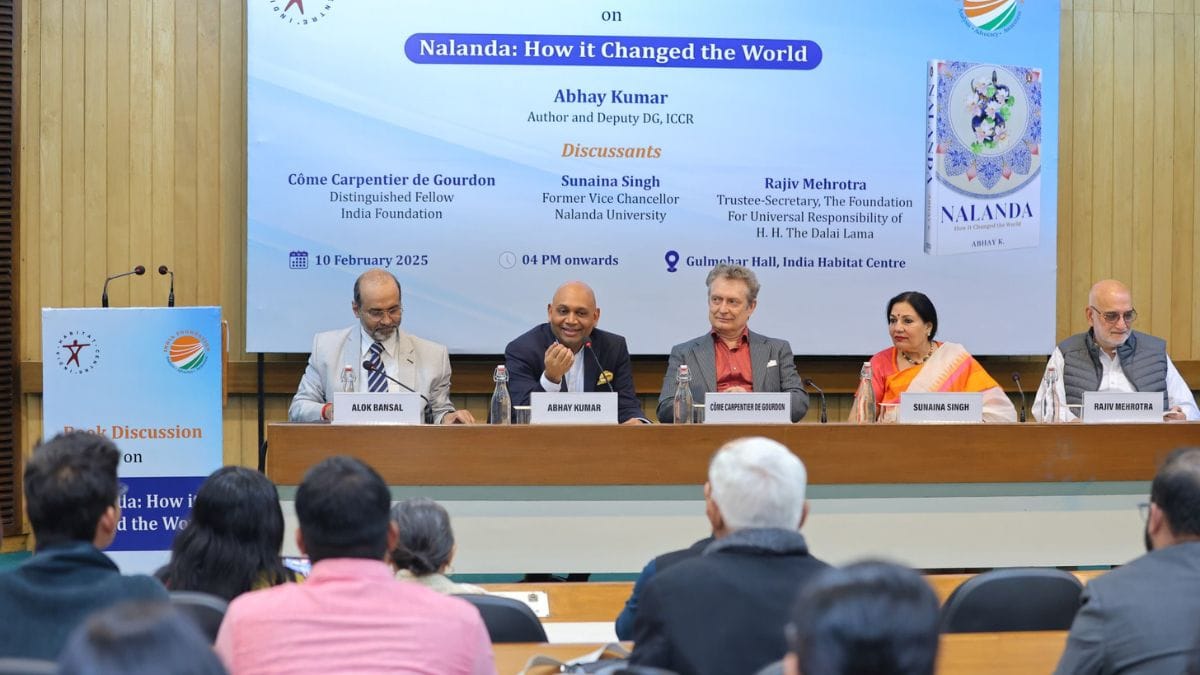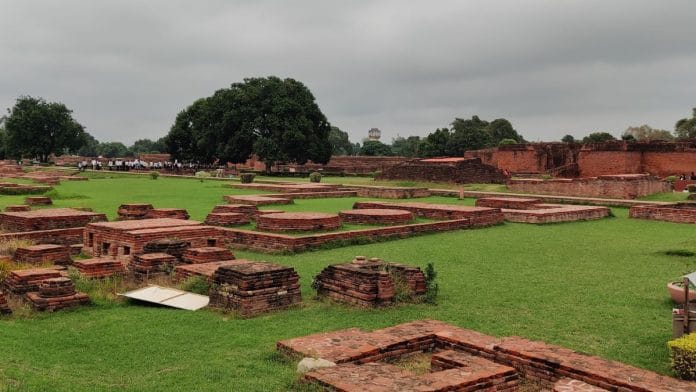New Delhi: The culture of debate was one of the greatest achievements of Nalanda University when the Indian learning hub was in its prime more than a thousand years ago, said Alok Bansal, director of India Foundation at the launch of diplomat Abhay Kumar’s book Nalanda: How it Changed the World on 10 February.
Bansal was responding to former Nalanda University vice-chancellor Sunaina Singh, who spoke about her futile efforts at replicating the lotus ponds from the ancient university at the new campus.
“I think the lotus will bloom (at Nalanda) when we start debating inside the new Nalanda,” said Bansal inside the fully packed Gulmohar Hall of India Habitat Centre that erupted in laughter.
Kumar’s book unveils the mysteries around Nalanda—its rise and downfall, highlighting its contributions in various fields. The book also explores the lives of great luminaries, such as Nagarjuna, Aryabhata, Dharmapala, Silabhadra, and Dharmakirti, who contributed to Nalanda’s unparalleled reputation.
Singh was joined by Come Carpentier de Gourdon, distinguished fellow at India Foundation, Rajiv Mehrotra, Trustee-Secretary, the Foundation for Universal Responsibility of His Holiness The Dalai Lama and Alok Bansal. Seated in the audience were university professors, ambassadors, and history students.

A short video showing the Nalanda ruins was also played at the event.
Rajiv Mehrotra asked what we are doing with our universities today and to what degree are they following the traditions of Nalanda. He said some of the European universities, Oxford and Cambridge, for example, beat us to it. Post-Nalanda, they have embodied that tradition of the tutorial system—where students learn through lectures, discussions, debates, interactive tools and in-depth analysis of various subjects.
“There is no victor in the Nalanda tradition of debate. It is basically to reach out to each other’s logical inconsistencies where they exist, so that a process of clarification takes place for the participants in the debate,” said Mehrotra, adding that it is the attitude of humility, not the certitude and arrogance that comes from winning the debate.
He also stressed that the ability to embrace contemporary knowledge is an essential aspect of the Nalanda tradition. “Each practitioner there was open. Knowledge was not frozen in the textbooks or the teachings that have preceded them.”
The ancient Nalanda University contributed immensely to the fields of mathematics, arts, philosophy, medicine, and the manuscript culture, particularly the Tibetan manuscript.
“Nalanda had a very multifaceted, multidisciplinary approach to knowledge which is now being revived because now we have American and British scientists, social scientists, working on a unified theory of knowledge, which were very much part of the Indian tradition and Nalanda’s teaching syllabus,” said Gourdon.
Also read: Bengaluru traffic police get an image makeover. A new museum shows them as heroes
A ‘dharmik’ institution
Author Abhay Kumar belongs to Nalanda but he didn’t know its history. His curiosity is recent. A visit to Nalanda two years ago inspired him to find out more about his city.
Kumar said his book is an intervention to showcase how Nalanda has shaped the modern world. The author said Buddha was not only a great, enlightened person but also a strategist.
“Because to found a religion is not merely your ideas and, it also requires lots of political acumen,” said Kumar.
Sunaina Singh described the old Nalanda as a dharmik (religious) institution.
“It’s an inter-civilisational dialogue that harmonises different disciplines. Because you do have philosophies, Hindu scriptures, Vedas, Dharmashastras, the six schools of Darshana that were taught,” she said.
In the past few decades, many institutions have been named after Nalanda, inspired by the original Nalanda Mahavihara, and have been established across the globe—-from Brazil, Toronto, Malaysia to Singapore.
“This tradition of naming new institutions after Nalanda Mahavihara—as the learning centre was known back in the day—suggests continuity of the idea of Nalanda,” reads Kumar’s book.
Kumar said it gives him hope that humanity will someday learn to settle all its disputes through the great Nalanda tradition of debate and discussion and avert violence and war forever. “In this direction, Nalanda’s continuity and resurgence within India and abroad is a source of great hope,” he said.
The Nalanda tradition
Nalanda University emphasised three ways of learning—Pariyati (learning theory), Paripati (practice) and Parivedna (experience).
Singh cited Ramdhari Singh Dinkar’s long poem titled Magadh-Mahima. “Ye khandhar unka jinka jag kabhi shishya aur das bna tha, yeh khandhar unka, jinse bharat bhu ka itihas bana tha (These ruins belong to those whom the world once served as a disciple and slave, These ruins belong to those who shaped the history of the land of Bharat.)
“History of India was made by Nalanda but somewhere we are losing it and perhaps it is time for us to recapture and revive Nalanda,” said Singh.
A member of the audience asked the author to list some of the core principles of building great institutions.
“Great institutions are not built by buildings, or air-conditioned rooms. Great institutions are built with principles. And Nalanda had universalism and democratic principles,” Kumar replied.
(Edited by Ratan Priya)






